Few know what an oral irrigator is, since the product is relatively new in our market. In this article we will tell you in detail what it is and how to use it.
What is it and how does it work?
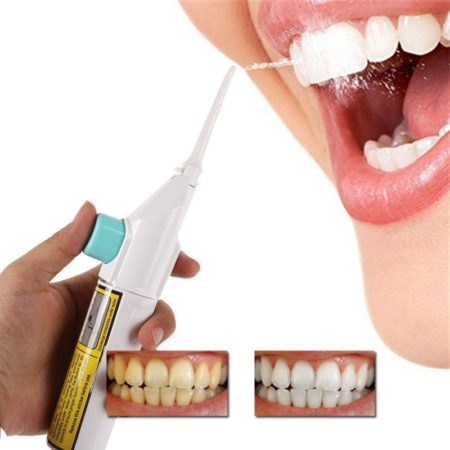
This is a device that cleanses the oral cavity by applying a pressure of water. Ordinary brushing practically does not cope with its function and cleaning the teeth is very superficial.
And in hard-to-reach places, it does not reach in any way, even if its design is modern and is designed specifically for this. So, in hard-to-reach places, microorganisms, bacteria, food debris begin to accumulate, which eventually lead to a deplorable oral cavity. Stones appear, indelible plaque, caries begins to develop, which entails infection of the whole organism as a whole.
The irrigator easily solves these problems. The supply of water in it is not simple, but pulsating, powerful. It can not only cleanse food debris, but even break tartar! At the same time, the procedure does not cause discomfort and pain. By the way, in dental clinics, plaque is removed in an identical way.
The principle of his work is completely elementary. The water is supplied to the device under a certain pressure and due to the fact that the tube with the atomizer is very thin, the pressure comes out quite intense, moreover, water gets on the teeth and gums mixed with air, which gives an additional result.
This device not only replaces dental floss, but also acts much more efficiently. And for enamel it is safer. It costs, of course, much more. But for people who look after their teeth, this amount will not be as tangible as the amount they spend on fixing problems caused by not thoroughly cleaning the mouth on a regular basis.
![]() See also - How to use an inhaler
See also - How to use an inhaler
What problems does the irrigator struggle with?
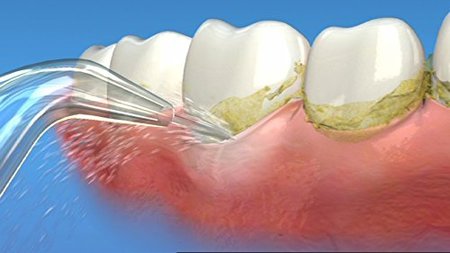
So why do you need an irrigator? First of all, he is able to remove tartar. And this is a very significant thing. In any case, it must be removed regularly when visiting the dentist, otherwise, it entails big problems.
So why is tartar dangerous?
It is dangerous because it is practically invisible externally, on the front teeth, if a person regularly brushes his teeth and uses phlox. But inside, on the farthest teeth, he is all the same. And over time, bacteria begin to destroy the enamel, giving an impetus to the development of caries.
But, not only teeth suffer from stone. Gums also begin to become inflamed. Paradontosis, periodontitis, often, is also provoked by it.The irrigator will save you from this, do not hesitate.
For the prevention of gum disease and caries - this is simply an indispensable thing. It massages the oral cavity, causing additional blood flow to the tissues, which means that they are enriched with oxygen and strengthened.
How to use an irrigator?
It is quite simple to use and anyone can handle it. You just need to get used to properly direct the stream of water. If you gape and the pressure of air with water gets into the respiratory tract, then you are guaranteed unpleasant sensations.
In general, they must be accompanied by instructions, which describe in detail how to use the irrigator correctly.
![]() See also - Comparison of irrigators Waterpik WP-100 E2 Ultra and Revyline RL 500
See also - Comparison of irrigators Waterpik WP-100 E2 Ultra and Revyline RL 500
For what indications is the irrigator recommended?
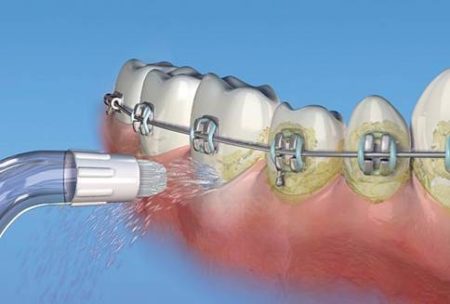
There are no special indications, but for those who wear braces, have fixed bridges, crowns and implants, an irrigator is a must.
Even special brushes for braces are not able to completely clean out the remnants of food and plaque, and the irrigator can easily cope with this. Also, it provides better engraftment of the implanted tooth, due to the fact that it massages the gums and increases blood flow.
For those who suffer from gingivitis, for example, an irrigator will be a real salvation. Also, for patients with diabetes, in fact, their gums are very weak, since the tone of the vessels is extremely low. Thanks to its use, bleeding and loosening of the teeth can be avoided.
It is also worth mentioning his ability to clean out the so-called periodontal pockets. Neither the brush nor the phlox can reach them in any way. But the accumulation of bacteria in them, leads to the fact that the most unpleasant of caries begins - root.
Well, and we think it’s not worth saying that thorough cleaning is the guarantee that your breath will be fresh.
And yet, they can rinse their nose if a runny nose begins. And it acts much more effective than an inhaler or washing with a regular syringe. By the way, in his tank you can add various tinctures and medicines that, when mixed with water and air, will give an amazing effect.
Contraindications for use and side effects
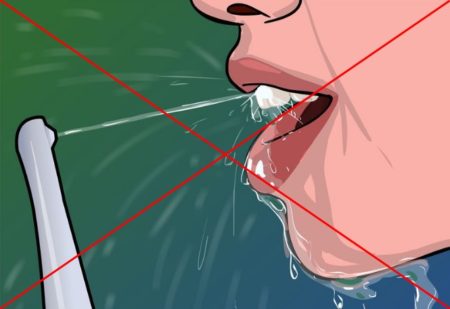
- Do not use it on the same day that you installed braces, crowns, bridges.
- Do not use it in the first three days after implant placement
If, from using the irrigator, your gums deteriorate, then temporarily stop using. And then start again, but with a little pressure and gradually accustoming weak gums to massage, then the side effect will not happen.
And so, there are no more special contraindications. Customer reviews about it are unanimously positive.
Modifications to Irrigators
They are:
- Portable (travel)
- Stationary
- Connected to the water supply
Which one to choose is a matter of your taste. They are all expensive for the price, but you should pay attention to the fact that the road, for example, is not designed for very frequent operation.
It works on a battery, the water pressure is much weaker than in a stationary one, which is connected to a regular 220 volt network.
Those that connect to the water supply are also quite convenient. Many people think that it is not worth using them, since the quality of the water in the tap is very poor. But, to be honest, these are incomprehensible fears.
Nobody cleans their teeth with distilled water! And nothing, everyone is alive, healthy and jaw in place.
What to look for when buying?
- Be sure to choose the irrigators of those companies whose service center is in your city. The device is relatively new, therefore, in the event of a breakdown, there may be problems with finding a master.
- Also, don't be tempted by the cheap price. As a rule, these are disposable irrigators, that is, those that work before the first breakdown and cannot be repaired.
- Pay attention to the water jet technology. It happens pulsating, and sometimes micro-bubble. The latter is more effective, but the cost of such devices is also more expensive.
- Choose only the irrigator in which it is possible to adjust the water pressure. Especially if you have weak gums that need to be gradually accustomed to pressure.
- The attachments are also important. The more there are, the more functional the thing.
Here, it seems, they all told and did not forget anything. You already know what an oral irrigator is and we hope our information will help you choose a good device!
See also:


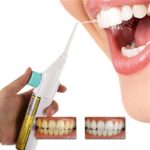
Previously, I did not even think about the irrigator, I did not even know about its existence. Then I saw a post about him on Instagram and decided, when visiting the dentist, to clarify whether he was worth buying this device home. The doctor approved this miracle of technology and said that according to the principle of action, this is a kind of dental floss, only better. I ordered a B.Well irrigator in an online store, the price is quite affordable, the declared characteristics were also arranged. While everyone is happy, she has been charging for almost a month, 3 operating modes, perfectly cleans all the interdental spaces.